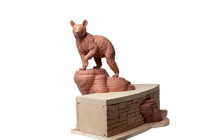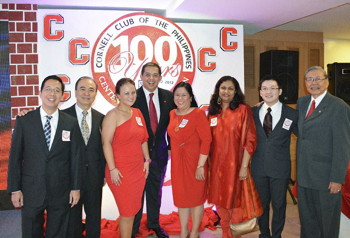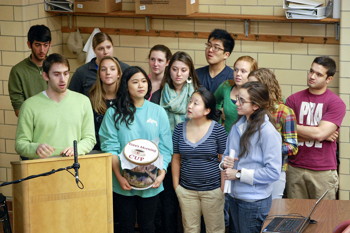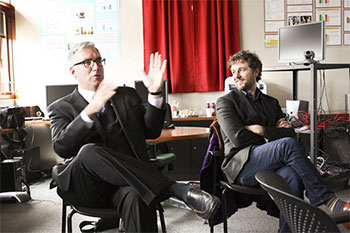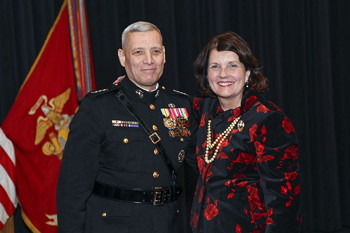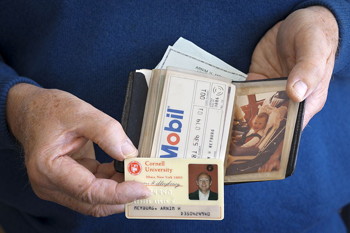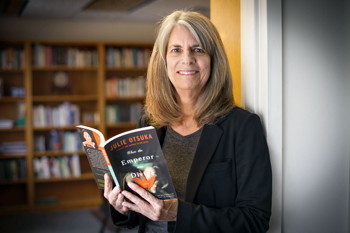THE ESSENTIALS
ON CAMPUSBear of a project
A bronze statue will pay tribute to the four black bear cubs who served as Cornell's unofficial, original mascot, Touchdown. John H. Foote '74 and Joseph Thanhauser '71 are spearheading a project to erect the statue and create new landscaping on the corner of Campus Road and Garden Avenue near the front entrance to Teagle Hall.
The statue (clay maquette model pictured at right)is expected to be unveiled at Homecoming 2015, during Cornell's sesquicentennial year. That year also marks the 100th anniversary of the first Touchdown bear, the first undefeated national championship season of the Cornell football team, and the 100th anniversary of Schoellkopf Field.
Foote, author of "Touchdown: The Story of the Cornell Bear," says the first bear was considered by many to be the magic ingredient for that 1915 championship season.
There were four Touchdown cubs in all - in 1915, 1916, 1919 and 1939.
The statue will be a gift from alumni and friends. Foote, Thanhauser and Alon Mass '08 provided initial funding for the $250,000 project. They are encouraging other alumni and friends to join them in supporting it. Funds will cover site preparation and landscaping, the statue, and a maintenance endowment.
Visit http://www.alumni.cornell.edu/touchdown/.
Philippine alumni mark centennial
The Cornell Club of the Philippines marked its centennial this past fall. Students from the Philippines first attended Cornell in 1902, enrolled in the law and agriculture colleges. The relationship was further strengthened after World War II, when the university played a significant role in rebuilding the University of the Philippines in Los Ba–os, with more than 100 Cornell faculty and staff lending their expertise in research, teaching and extension.
Kathryn Boor, dean of the College of Agriculture and Life Sciences, traveled to the Philippines in November and visited the International Rice Research Institute (IRRI), hosted by IRRI Director General Robert Zeigler, Ph.D. '82.
CREATED@CORNELL
Flavor toss-up
Here's the scoop: Paying tribute to the new Cornell NYC Tech campus, two groups of Cornell students won a class ice cream contest for their flavors - Big Red Apple and Ezra's Morning Cup.
The ice cream contest was the final project in the introductory food science class. For the first time, two flavors tied for first place. Big Red Apple pairs a vanilla base with apple flavoring, touches of cinnamon sprinkles, caramel swirl and crunchy bits of graham cracker. Ezra's Morning Cup awakens a vanilla base with espresso-tint and a white chocolate swirl and is named for the university's founder. The group's target audience, their report said, was "already over-caffeinated college students."
Later this spring both ice creams will be sold at the new Cornell Dairy Bar.
Keith Olbermann '79 helps WVBR move to new digs
The student-run independent radio station WVBR-FM will have a bigger, more functional home this fall, helped by a gift from one of its best-known alumni, Keith Olbermann '79.
Substantial support from the political commentator and sportscaster to the Cornell Media Guild, the independent entity that owns and operates WVBR and Cornellradio.com, has aided in the purchase of 604 E. Buffalo St.
The newly purchased building in the Collegetown area is twice the size of the current headquarters, said Drew Endick '14, general manager of WVBR and president of the Cornell Media Guild. It will be called Olbermann-Corneliess Studios, named for Olbermann's late father, Theodore Olbermann, and for Keith Olbermann's friend and former WVBR colleague Glenn Corneliess '79, who died in 1996 at age 39.
The students, who are in the midst of a $935,000 capital campaign, plan to move to the new building in the fall. Many alumni in addition to Olbermann have helped them raise funds.
No. 2 Marine
U.S. Marine Gen. John "Jay" Paxton '73, M.Eng. '74, received his fourth star and became assistant commandant of the Marine Corps Dec. 15. According to Kevin Bruns '79, president of the Cornell Delta Upsilon Association, about a dozen Cornellians, including nine Delta Upsilon alumni, were among the 200 attending the ceremony. Paxton's wife, Debbie, is also a Cornellian (Class of 1975).
Bruns said that Paxton spoke at the ceremony about the four greatest influences on his life - one was his deep friendship with his DU brothers and his experience at "6 South Avenue" during his Cornell years. Paxton was president of DU, a member of the 1971 NCAA lacrosse championship team and also played football.
LOST & FOUND
Deconstructing Arnim's wallet
Imagine Arnim Meybur's surprise early this year when he received a call that his wallet had been found. He looked at his wallet beside him, puzzled.
Then a distant memory came to him.
The professor emeritus of transportation engineering and plannin's wallet had been stolen from his briefcase in his Hollister Hall office in the mid-1980s. Construction workers at the Law School, across the street from Hollister, found the wallet below the Law School library while tearing down an interior wall and ceiling.
"Needless to say, I was astounded about the find and its location ... Meyburg wrote to contractor Welliver and McGuire to commend their workers who tracked Meyburg down online. "But I was even more impressed that these two gentlemen cared enough to contact me."
The wallet was completely intact, Meyburg wrote, including credit cards, drive's license and photos of his then baby daughter.
Internment camp novel chosen for reading project
New students will be reading Julie Otsuka's 2003 novel, "When the Emperor Was Divine," this summer. The selection for the New Student Reading Project, Otsuka's novel tells the story of an ordinary Japanese-American family's three-and-a-half-year-long internment during World War II. From varied perspectives - the two young children, the mother, the internment community and the father - the novel offers a concrete view of personal struggle, dignity and tragedy in a context of exile and racism.
The subject matter was personal for the author - members of her own family were interned - but instead of incorporating family stories into the novel, Otsuka did extensive research.
Related resources: reading.cornell.edu.


